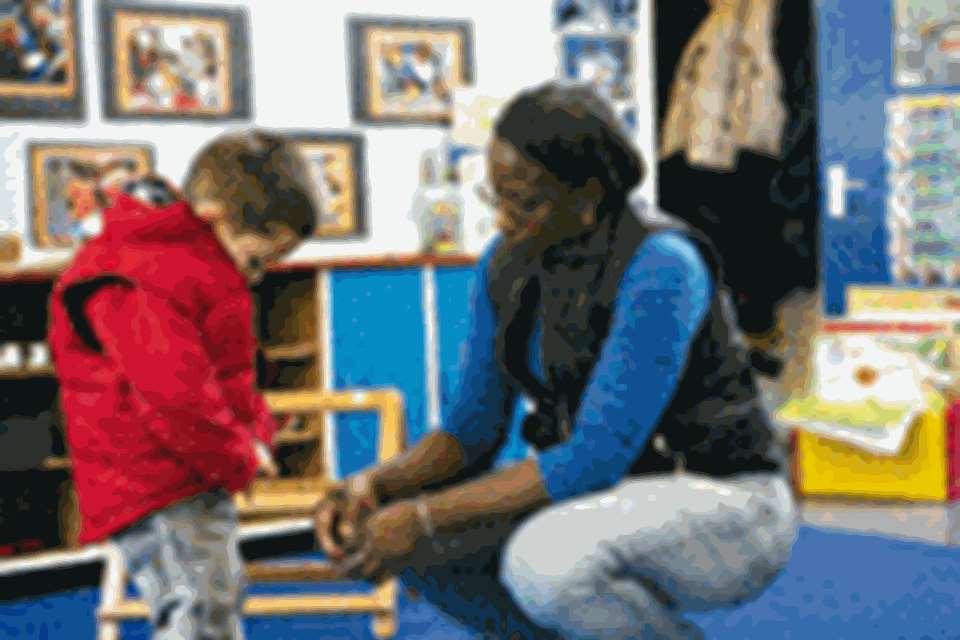Positive Relationships: Key Person Role - Love me do?
Monday, August 10, 2015
All children need love, but a key person's part in providing it should be considered with care.

When parents bond with their babies, it is called love. This love enables their baby to form secure attachments with them. It is now known how important this is for the growth of the baby's brain and that the absence of love actually hinders the physical growth of the brain and therefore limits development.
So, does a key person need to love a child in their care? Should a child be encouraged to love an adult who is a carer, not a parent? Or would this be an encroachment on the intimate world of family relationships? What happens at the inevitable parting when a child or carer moves on?
These are very difficult ethical questions, but they do need to be considered. An essential element of life is the fact that we have loving relationships with our families, friends and partners. Some of those relationships are more intense than others, some last forever, and some we move on from. Saying goodbye to someone we love is hard, but we are able to do it with the right support; saying goodbye and coping with loss is part of our emotional growth journey.
It used to be thought that carers should not become attached to children they care for, as the parting might be too damaging. Nowadays that is no longer thought to be helpful, as children in early years settings, especially very young children, need to be held in loving relationships in order to be emotionally secure, to grow and to thrive. This is sometimes called professional love.
A child who attends an early years setting needs to be cared for in a warm, consistent and loving way. Having a sense of professional love towards babies and children cared for in early years settings suggests that a key person needs to have a loving commitment towards a child, so needs to behave in a way that shows this.
A key person may feel emotionally attached to a child, but it is unlikely that a key person will do so in the way that a parent does. A key person may not become emotionally attached to every child they have ever cared for, but they will treat each child with the same degree of loving commitment. This honours each child's need for a protective and loving relationship while they are away from their parents. This is the basis for enjoying and making the most of the opportunities available in an early years setting.
THINK ABOUT:
- How do you care for each and every child in a loving way and demonstrate commitment towards them?
- How do you describe what you feel for each child?
- How do you cope with parting from children you have grown to love or become attached to?
- How do you show the same amount of loving commitment towards a child you are not immediately drawn to?
- If you are finding it hard to feel loving towards a child who can you discuss this with so that the child does not miss out on loving commitment while in your care?
- If you have got very attached to a child, how do you cope with your sense of loss when they move on?
This is an extract from Being a Key Person in an Early Years Setting (Pre-School Learning Alliance)
THE BOOK: BEING A KEY PERSON
Being a Key Person in an Early Years Setting, published by the Pre-School Learning Alliance, explores the relational nature of being a key person, showing how loving relationships between key person and child not only nurture children's emotional well-being but also promote their potential to learn.
The book starts with an explanation of attachment theory and its importance for children's emotional security and learning, and goes on to explore how young children might experience transitions, and the benefits of using a graduated settling-in process to support them when they start in a new setting.
The importance of working closely with parents as partners in children's learning is also discussed in the context of developing the 'relational triangle' between child, parent and practitioner - a highly effective tool in promoting positive learning outcomes.
The book is accompanied by exclusive online resources, comprising a range of activities relating to each chapter in the book. These are suitable for personal reflection or team use at staff meetings and training days.
To order a copy of Being a Key Person in an Early Years Setting (£9.55 for members; £13.95 for non-members), visit www.pre-school.org.uk/shop, call 0300 330 0996 or email shop@pre-school.org.uk.
[asset_library_tag 880,Download the pdf]












